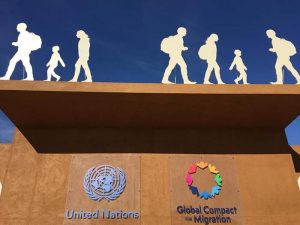

Entrance to the Intergovernmental Conference on the Global compact for Migration (photo: UN-Habitat)
On the back drop of the Intergovernmental Conference to adopt the Global Compact for Migration for Safe, Orderly and Regular Migration, UN-Habitat contributed to the 5th Mayoral Forum Mayoral Forum on Human Mobility, Migration and Development and organized a side event alongside the Intergovernmental Conference. Together with partners from the Centre for Mediterranean Integration (CMI), the Organization for Economic Cooperation and Development (OECD), the United Nations Conference on Trade and Development (UNCTAD), UN-Habitat’s interregional advisor, Dyfed Aubrey moderated the side event which included Fulvia Farinelli (UNCTAD); Anna Piccinni (OECD); Janette Uhlmann (CMI), Mohamed Boussraoui (UCLG) and Sharmaarke Abdullahi (UN-Habitat).
“Investing in the ability of cities to integrate and empower people of different backgrounds in an era of human mobility is essential for sustainable urban development,” said UN-Habitat’s Dyfed Aubrey.
The panelists shared promising practices of integrating migrants in cities and communities and introduced the tools for local authorities including practical checklists for action plans, entrepreneurship and how to increase opportunities for youth to be fully engaged in their new adopted home. The partners agreed to strongly cooperate and coordinate their work around migration, with the aim to develop joint tools and conduct capacity building activities. The side event garnered a huge following with more than half a million impressions on UN-Habitat’s posts and tweets during the event, showcasing interest in UN-Habitat’s work on migration.
UN-Habitat is committed to implementing the Global Compact in partnership with member states, development actors to provide coherent and tailored support to national authorities, city leaders and communities for making cities inclusive and liveable for all inhabitants. UN-Habitat gives particular attention to support city leaders, as local authorities ultimately bear the responsibility of ensuring that the impact of migration to cities, and have a key role in coordinating communities and local stakeholders for employment opportunities, integration projects for youth, women and the most vulnerable as well as creating a positive urban environment for all.
“The Global Compact for migration has the potential to change communities and lives. Local authorities play a crucial role for the integration of migrants and for ensuring that no-one is left behind.” said Sharmaarke Abdullahi of UN-Habitat.
For further information, please contact Dyfed Aubrey (dyfed.aubrey@un.org); Sharmaarke Abdullahi (sharmaarke.abdullahi@un.org); Jesus Salcedo (jesus.salcedo@un.org) or Stephanie Loose (stephanie.loose@un.org);


